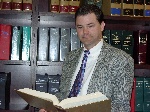Grosse Pointe RICO Act Lawyer, Michigan
Sponsored Law Firm
-
 x
x

Click For More Info:
-
Boyer Law Group
43805 Van Dyke Avenue Suite A Sterling Heights, MI 48314» view mapAccident & Injury Law Seasoned. Successful. Supportive.
Through detailed research, extensive preparation and a winning strategy developed for each client, our attorneys are fully committed to successfully resolving legal issues.
800-942-1270
Not enough matches for Grosse Pointe RICO Act lawyer.
Below are all Grosse Pointe Criminal lawyers.
Jeffery D Maynard
The attorneys of Maynard Law Associates, PLLC are skilled at walking our clients through each step of the complicated legal process. If you are co... (more)
Nathan A. Dodson
✓ VERIFIED *Status is reviewed annually. For latest information visit hereWe have over 20 years of combined legal experience, handling criminal law and defense cases, family law matters, including divorce and child custody c... (more)
 William G. Boyer Sterling Heights, MI
William G. Boyer Sterling Heights, MI Practice AreasExpertise
Practice AreasExpertise

